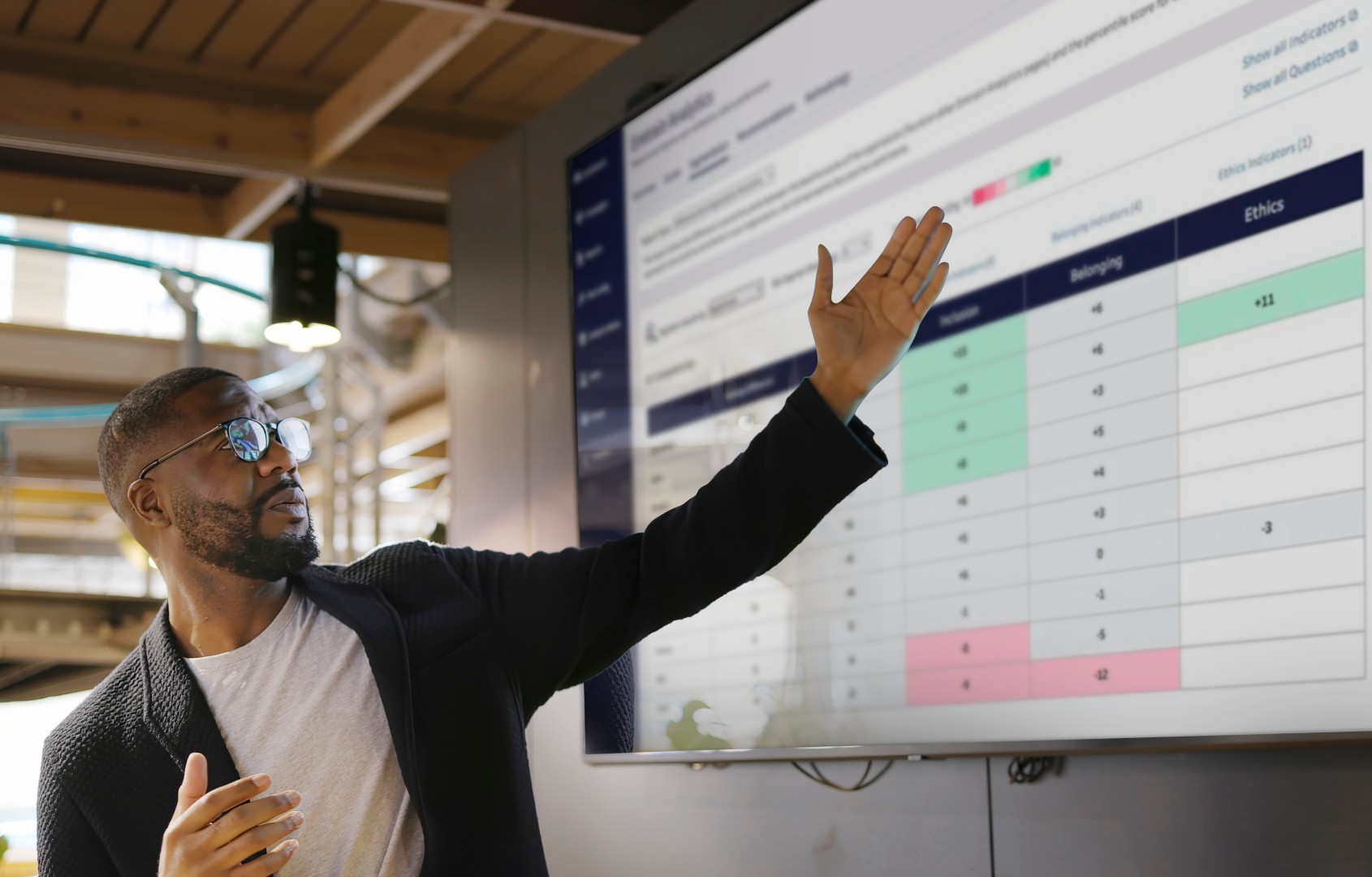Remember when “leave politics at the door” was actually possible? Those days are gone.
Our latest workplace culture analysis reveals something that HR leaders have been whispering about in closed-door meetings: political polarization hasn’t just entered the workplace—it’s fundamentally reshaping how colleagues relate to each other. And the collateral damage? A measurable decline in empathy that’s quietly undermining organizational performance by way of team alignment and cohesion.
This isn’t about judgment. This is about understanding a trend that’s turning professional environments into spaces where people are increasingly self-protective, less connected, and struggling to collaborate due to differences that were once kept outside the office walls.
Welcome to the 2nd installment of our 2026 Workplace Culture Report series, where we continue our exploration into the evolving dynamics of workplace culture—this time focusing on the empathy recession and the rise of political polarization.
From Pandemic Empathy to Present-Day Decline
The irony is hard to miss. Just a few years ago, during the height of COVID-19 and the racial equity reckoning of 2020, empathy became a workplace buzzword. Leaders championed it. Organizations measured it. Employees demanded it.
Now? That empathy is evaporating.
We’re seeing a consistent pattern of erosion across all organizational levels:
- Managers are showing less curiosity and empathy toward their teams
- Employees are making less effort to see things from others’ perspectives
- Declining respect, civility, and inclusiveness in day-to-day interactions
- An uptick in hurtful or offensive jokes that were once forbidden
The headline finding: Workplace conflict arising from differing social and political views has surged dramatically. This isn’t a minor irritation—it’s a disruptor of workplace harmony and collaboration.
Understanding the Mechanics: How Empathy Actually Works
To address this decline, we need to understand what we’re losing. Empathy isn’t just a feel-good concept—it’s a business-critical competency with measurable impacts. It’s also a skill that people can choose to, or not to exercise, depending on how important people think it is.
Curiosity & Empathy: The Foundation of High-Performing Teams
At its core, empathy is “the practice of listening and learning about others without negative judgment.” When it’s present:
- Managers reduce unnecessary escalations and improve problem-solving capacity
- Teams build high-quality relationships that enable openness and honest feedback
- Organizations gain agility to adapt to new people, processes, and changes
- Conflicts get resolved before they derail productivity
When empathy recedes, the opposite happens. People retreat. Communication becomes transactional. Problems fester. Innovation stalls because no one wants to risk being misunderstood or attacked.
The “Us vs. Them” Trap: In-Group/Out-Group Dynamics
Here’s where workplace polarization gets particularly dangerous. When political and social divides infiltrate professional spaces, they trigger something psychologists call in-group/out-group dynamics—the human tendency to favor those similar to us while distancing from those we perceive as different.
The definition: “How ‘us vs. them’ behaviors shape employee experience, engagement, and opportunity.”
Why it matters: Some groups have drastically different experiences in the workplace, and the in-group is often completely unaware of this reality. When out-group members don’t receive equitable treatment, it doesn’t just feel unfair—it actively diminishes collaboration and productivity. Demographic differences begin to limit contributions from entire segments of your workforce.
The stakes are clear: when people can’t see past their in-group, organizations lose access to the diverse thinking they desperately need.
A Glimmer of Hope (If We Act Fast)
Not everything is trending downward. Our data revealed two important counterpoints:
First, in-group/out-group dynamics haven’t yet significantly undermined teamwork. This suggests there’s still time to intervene before these divides calcify into permanent fractures.
Second, there’s a slight increase in employees reporting that their co-workers are “pretty good about expressing personal or political opinions without offending people.” At least some people are trying to navigate this minefield thoughtfully.
Small actions matter. They show that intentional effort can make a difference, even in a polarized environment.
The Real Cost: What Happens When We Don’t Address This
Let’s be clear about what’s at stake when empathy recedes and polarization grows:
Team Performance: When colleagues can’t see beyond their own perspectives, collaboration suffers. Problems that could be solved with a conversation instead require HR intervention.
Innovation: Psychological safety—the foundation of creative thinking—depends on empathy. When people feel judged or dismissed, they stop sharing ideas. Your best innovations never see the light of day.
Talent Retention: High performers don’t stick around in toxic environments. The employees with options will exercise them, leaving you with those who can’t leave—not exactly a recipe for excellence.
Manager Burnout: Leaders are already overwhelmed. Adding constant conflict mediation and navigating political landmines accelerates the leadership crisis we’re already facing.
Moving Forward: From Awareness to Action
The empathy recession isn’t inevitable, but reversing it requires more than good intentions. It demands:
Naming the problem explicitly. Acknowledge that political polarization has entered your workplace and commit to addressing it directly, not pretending it doesn’t exist.
Rebuilding empathy as a core competency. This means training, modeling from leadership, and making curiosity and perspective-taking non-negotiable expectations for everyone—especially managers.
Creating boundaries. Train managers to be the first line of defense to toxic comments, jokes, and conversations. They should model respectful behavior and intervene if they hear inappropriate comments.
The question isn’t whether political polarization will continue affecting workplaces—it will. The question is whether your organization will build the empathy muscles needed to navigate it, or whether you’ll watch collaboration and performance deteriorate while hoping things somehow improve on their own.
The data is clear. The choice is yours.
Ready to Address the Empathy Recession and Political Polarization?
Understanding the trend is the first step. Taking action is what separates organizations that thrive from those that struggle.
Discover practical strategies to rebuild empathy and navigate polarization:
- Get tools to measure empathy and in-group/out-group dynamics on your teams
- Use microlessons to teach empathy and conflict resolution skills to employees
- Support managers with manager’s action guides to navigate political tensions on their team








